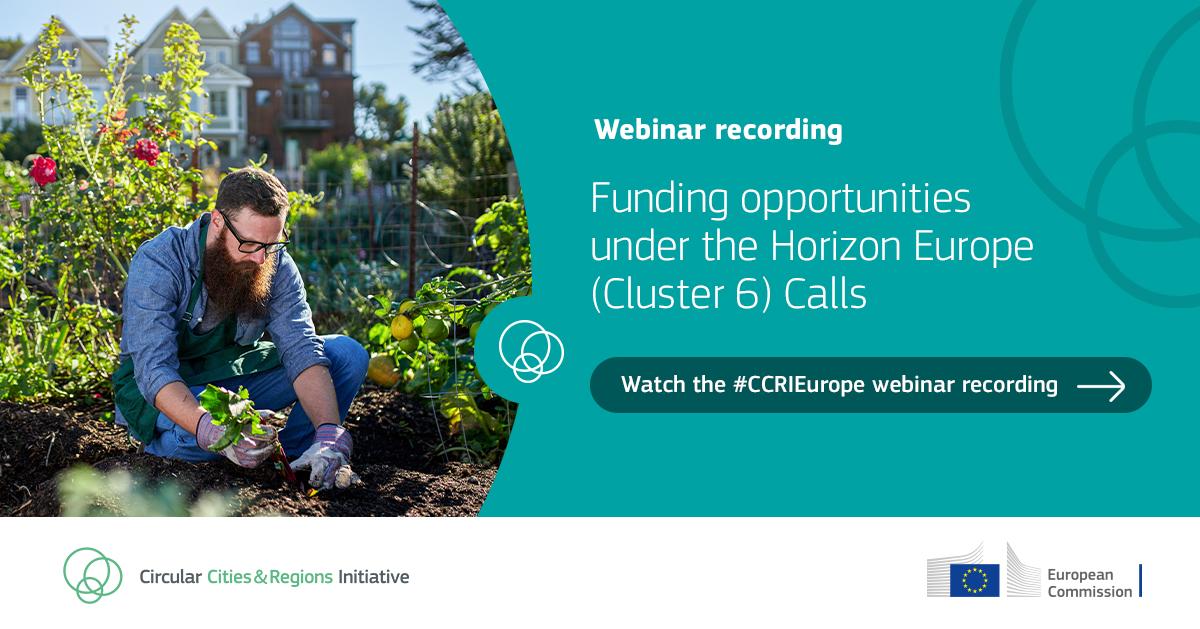Webinar on the new Horizon Europe calls for proposals for circular economy at local and regional scale
Updated on 09.03.2023
The webinar presented the Horizon Europe calls 2023 on circular economy (CE) at a local and regional scale. The webinar also presented concrete experiences of cities, regions and other relevant stakeholders in applying to Horizon calls.
Circular Cities and Regions Initiative Coordination and Support Office (CCRI-CSO)
More information
-
Should you have any questions on the Horizon Europe Calls for Proposals, please refer to the European Commission’s Research Enquiry Service.
-
The Horizon Europe Work Programme – Cluster 6 is published on the Funding and Tenders Portal. The 2023 calls for proposals will open on 22 December and close in March/April.
-
You can also use the partner search on the official website of the European Commission to find potential partners for setting up your project consortium.
-
More information about the roles of the CCRI Pilots, Fellows, Projects and Associated Partners on the CCRI stakeholders page (note that the profiles also identify key contact persons).
Relevance for Circular Systemic Solutions
Key messages from presenters:
Cristina Sossan, City of Milan
The city of Milan has a strong political commitment for CE policies. Based on the 2015 Universal Expo, in the same year the city of Milan continued its strong focus on circular and sustainable food policies, launching the Milan Urban Food Policy Pact (MUFPP) at an international level and approving its urban food policy at a city level. The Urban Food Policy provided the city and all relevant stakeholders with a policy framework, a vision, and clear objectives. Successful applications to Horizon provided significant resources for the implementation of this vision.
The Horizon 2020 Food Trails project provided significant resources for the implementation of this vision: in its 11 partner cities, Food Trails will develop participatory Living Labs, innovative pilots, and transformative food policies. In her presentation, Cristina underlined the importance for a city to set-up a dedicated team to apply to Horizon calls, and to be part of good consortia where the city can play a specific role, according to its vision and potential.
Although, applying to Horizon is not only an exercise for large cities! Medium and small cities can join and be active parts of consortia and learn from other stakeholders’ expertise in applying to Horizon calls. A crucial message: don’t give up in case the application is not successful at first; lessons learned can be applied in the future and increase the chance for a successful application.
Lydia González Fernández, Centro para el Desarrollo Tecnológico y la Innovación (CDTI)
As explained by Lydia, a national contact point for Horizon Europe has the role of supporting project promoters in Member States with their applications. Her presentation listed and explained tips on how to apply, starting from how to find partners and where to find official, useful information. She presented concrete examples of several consortia in their applications to Horizon calls and extracted key advice, including:
-
regions and local administrations are key in many topics in Horizon Europe calls;
-
there is not only one formula to participate;
-
make use of your networks;
-
join/build a consortium with Technological centres, partners in other projects/networks, private companies, and universities, which can all be good partners/promoters;
-
count on the National Contact Points (NCPs).
Anna Tenhunen-Lunkka, Horizon Europe (CCRI) project TREASoURcE
CCRI project TREASoURcE aims to initiate systemic change by developing technologies and circular systemic solutions (CSS) in cities and regions for currently underutilised or unused plastic waste, end-of-life electric vehicle batteries and bio-based waste and side streams. Anna’s presentations underlined key lessons learned from her consortium in applying Horizon Europe research and innovation funding.
The first thing to do is to create a strong project concept and build a good consortium. As a partner in a consortium, it is crucial to identify your own project needs and ambitions and conceptualise them clearly. Typically, effective administrative support is also needed to deal with all practicalities of the proposal. It is also important to identify personnel and resources available in addition to their expertise. Good and experienced coordinators can typically be found from research organisations, universities and also from for example cluster or ecosystem organisations.

e.g. B2B services
e.g. households, aware consumers, representatives of influential groups, trainers and educators
e.g. NGOs, citizens associations
e.g. chemicals, textile, ceramics, glass, cement, steel, bio-based industries
CEAP2 key product value chain
including bio-based economy
e.g. B2B services
built environment, CEAP2 key product value chain
CEAP2 key product value chain
CEAP2 key product value chain
e.g. chemicals, cosmetics, bio-based industries
e.g. electrical engineering, furniture and interior, textile and fashion
CEAP2 key product value chain
CEAP2 key product value chain
e.g. healthcare
CEAP2 key product value chain
CEAP2 key product value chain



